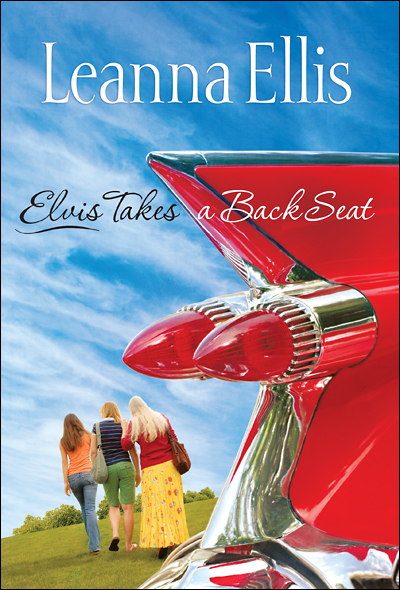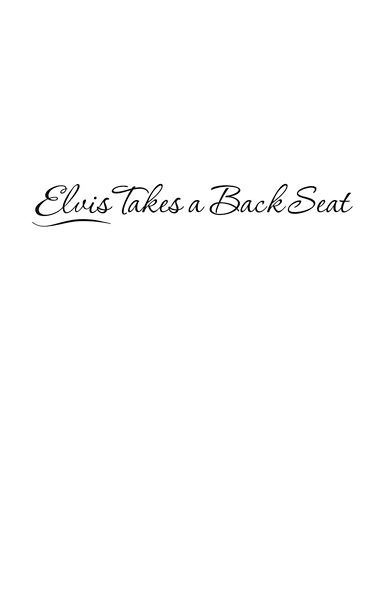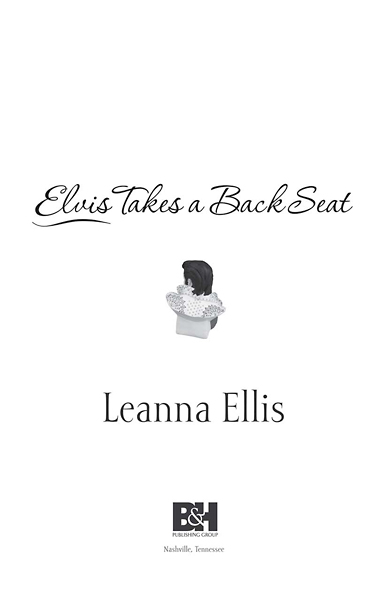Elvis Takes a Back Seat
Read Elvis Takes a Back Seat Online
Authors: Leanna Ellis




Copyright © 2008 by Leanna Ellis
All rights reserved.
Printed in the United States of America
978-0-8054-4696-8
Published by B&H Publishing Group,
Nashville, Tennessee
Dewey Decimal Classification: F
Subject Heading: CHRISTIAN LIFEâFICTION \ SINGLE WOMENâFICTION \ ADVENTURE STORIES
Publisher's Note: This novel is a work of fiction. Names, character places, and incidents are either products of the author's imagination or used fictitiously. All characters are fictional, and any similarity to people living or dead is purely coincidental.
Chapter One: I Forgot to Remember to Forget
Chapter Two: I Want You, I Need You, I Love You
Chapter Eight: (Now and Then There's) A Fool Such as I
Chapter Eleven: Don't Be Cruel
Chapter Twelve: Devil in Disguise
Chapter Thirteen: Why Me, Lord?
Chapter Fourteen: I Feel So Bad
Chapter Fifteen: Crying in the Chapel
Chapter Sixteen: You'll Never Walk Alone
Chapter Seventeen: Love Me Tender
Chapter Eighteen: All Shook Up
Chapter Nineteen: Impossible Dream
Chapter Twenty: Return to Sender
Chapter Twenty-One: It Is No Secret
Chapter Twenty-Two: It's Now or Never
Chapter Twenty-Three: Way Down
Chapter Twenty-Four: You Don't Have to Say You Love Me
Chapter Twenty-Five: Seeing Is Believing
I Forgot to Remember to Forget
I used to dream.
But now it's as if the TV in my mind has been turned off and a blank screen waits for me when I fall asleep at night. At least I'm not having nightmares. But I'm afraid the bulb has simply burned out.
Maybe I've simply forgotten how to dream. I've tried warm milk, sleeping pills, and staying in bed for what seemed like days (maybe it was). I've tried power naps, suffered restless legs, counted sheep, frogs, backwards. I've slept on the floor, in a chair, crossways in bed. Nothing works.
My dreams used to be miniature Broadway productions. Once I dreamed about a Laundromat with industrial-sized washers and dryers. Clothes spun around,
th-thunking
against the dryer walls, reminding me of a kettle drum pounding in a royal cadence. My father, his head as bald as
Yul Brynner's, his cheekbones bold against taut skin, strolled toward me whistling “Shall We Dance?” Then he asked about Mother. She went to be with him five years ago.
Mother visited me occasionally, still wearing the auburn wig she bought during chemo. She bustled into my subconscious, her voice chirping “Pick a Little, Talk a Little” right out of
The Music Man
. She would remind me to fix dinner, sweep the floor, go to church. Duty was Mother's idol.
Old boyfriends made brief guest appearances, congregating on the beach, kicking up sand, and tanning their torsos, belting out “There Is Nothing Like a Dame.”
But Stu has never rock-and-rolled his way into my dreams. If he did, I'm sure he'd be dressed like Elvis, hips swiveling, blond hair dyed black bobbing in rhythm, lip trying to curl. Maybe it's better not to think of him that way.
Stu had been my dream. His absence is the source of my emptiness, the reason my dreams have evaporated like dew on a hot, dry June day (which in Texas is hotter and drier than normal). Even when I had dreamed, I always turned toward Stu, reaching for him in the night. Now his side of the bed is empty. His glasses lay on the side table, beside the alarm clock, the lenses dusty from neglect.
As is the case most nights, I roll out of bed, not bothering to check the clock. I blink against the darkness. It's so early it's late. Before the paper boy has delivered the paper that I probably won't read. Before the neighbor's teenage son drives home after a late night with college friends and rolls a tire onto the curb. Before I've managed to get enough sleep.
I pad my way to the den and bang my toe into a box.
A curse word pops out of my mouth and makes the house sound more empty. The silence aches in my bones.
Leaning my elbow against a wall, I rub my bruised toe. I'd forgotten about the boxes scattered throughout the house. With the help of my Aunt Rae and Ben, Stu's best friend and my boss, I hauled down from the attic garbage bags of clothes and boxes of mementoes and forgotten items wrapped in newsprint and memories. Most everything is stuffed in the garage now, waiting to be sold tomorrow ⦠this morning.
It's too quiet. There are no car sounds, no dogs barking. I power up the stereoâStu preferred a turntableâflip the record player on, and an album drops down and begins to spin. Elvis's voice floats out of the speakers, crackly and supple, wrapping around me, tightening into a fist, squeezing my heart.
I curl up on the sofa and bury myself under a knitted blanket that used to hold Stu's scent, but over the last year and a half even that has faded. I miss the smell of Paul Sebastian cologne. I suppose I could buy a bottle or find Stu's under his sink, but it wouldn't be the same.
I poke my fingers and toes through the thick, soft yarn latticework. I vaguely remember, as a kid going to Sunday school, a story about somebody dreaming of angels climbing a ladder to and from heaven. I imagined the ladder being gold and glittering in the moonlight. I wonder if I could climb that ladder now or if Stu could descend.
Finally night gives way to the new day, but my mood remains dark and restless. My future is the same. There are no angels pointing me in the right direction. God is a black hole, engulfing my hopes and dreams.
* * *
“HERE GOES EVERYTHING,” I mumble and push the button. A whirring noise starts. In its cantankerous manner that reflects my own attitude, the garage door shifts against its will, lurches, and swings upward.
“What's this?” Aunt Rae pats an unmarked box, large enough to hold a small refrigerator. The oscillating fan we set up to combat the Dallas heat stirs her long gray hair. “A hidden treasure?”
“Might be that old lamp Stu's first boss gave us for a wedding present. Pretty hideous.” I straighten a poster-board sign that reads “$1 each.” Stu's business ties remind me of dinners and dances, parties and pain.
Rae separates the arthritic box tabs, sending dust particles in every direction. The dust sticks to my sweaty legs. I dig beneath the crumpled packing paper until I reach gleaming black pottery. Recognition slams into me, and a prickling heat crawls up the back of my neck. My stomach turns lumpy and sticky with irritation, like my mother's fig preserves that Daddy pretended to like but that I scraped off into the trash. The heat of the day presses in on me, intensifies like a solar flare. At the same time, sounds and awareness of others recede into the distance like a fog curling back toward the bay.
I shake off my crazy reaction. It's nothing. I won't let it be anything. I slap the tabs down, push the box toward the corner. Cardboard scrapes concrete. “It's nothing.”
“Oh, come on.” Rae puts a hand on my arm. “This lamp I gotta see.”
“Leave it alone,” I snap. In my head I hear my mother's
shocked gasp. “Claudia,” she'd say, “if you can't say something nice ⦔
I should go through these things alone although I haven't bothered. My weakness angers me more than my aunt's interference. “I'm sorry, Rae.”
She waves off my apology and dips her arms into the mounds of paper. Heaving, she lifts the object from inside the box and staggers backward. “What
is
this?” She grunts and struggles under the bulk.
The box catches on a chiseled nose. I step forward and tug the box loose. My stomach folds in on itself like cardboard crumpling. I kick the box out of the way (a little harder than necessary) and wince at my already-sore toe.
I embrace the hard edges of the base. Propping one knee beneath the bust, I brace an arm under the ceramic chin and a hand on the smooth, round head. “Aunt Rae,” I say, embarrassed as I maneuver the bulky pottery around to face her, “meetâ”
“Bless my blue suede shoes!” My aunt's mouth goes slack. “Stuâ”
“No,” I give the bust a quick glance, “Elvis.”
It isn't a sculpture of any report. Cheap and tacky, the Elvis bust ranks right up there with black-velvet wall hangings from Tijuana. Since the first time I saw him more than twenty years ago, I've wanted to get rid of Elvis. The heat of my anger burns hot until it slowly begins to evaporate, forming at first a barrier in my thoughts like a steamed-up mirror.
I remember Stu's college apartment where the bust held a place of honor on a stool in the corner of the den. Stu's giant stereo speakers were laid on their sides next to Elvis as if bowing to his sovereignty.
“What he said then,” Rae whispers, “it was true.”
Confused, I start to question her, but a flurry of expressions flicker across her face. She reaches out to touch the bust, then pulls back. Her many silver rings flash in the early morning sunlight, sending a kaleidoscope of colors bouncing around the garage, as uncatchable as her look. “You can't sell this, Claudia.”
“You're right.” I laugh off her theatrics. “No one in their right mind would buy it.”
“No, no.” She waves her hand, her bangles and charms clinking together. “It's too ⦔ She pauses, stumped as I was when I first met “Elvis” more than twenty years ago.
“Too much?” I supply. The bust weighs more than I remember and starts to slip out of my hands. I shove it onto the closest card table, pushing aside my mother's linens. From chest to pompadour, Elvis is a good three feet tall, a garish glorification of an American icon.
Rae touches one of the silver studs on Elvis's upright collar. In a low tone, she starts singing “All Shook Up.” In all her years away from Texas, she never lost her accent. Her twang gives the words of the song an extra lilt. Her voice is husky, warm and engaging. Her hips rock agilely, making her long, flowing skirt sway. Two customers enter the garage and watch my sixty-year-old aunt. But she doesn't seem to notice or care that she has an audience.
I can't help but think how different she is from my mother, her sister, who, if I gyrated like that, would have said, “Be still.” But Stu ⦠he loved loud music, unreserved affection, and all things Elvis. He would have loved Rae's rendition. My eyes burn.
“Stu would have had a conniption fit.” I try a laugh that snags on my jagged grief. “If only he'd known you shared the same taste in music.”
She halts her dance, her long skirt swishing around her ankles and clunky sandals. “We had many discussions of Elvis, Stuart and I.”
My smile falters. “No wonder he liked you so much.”
I remember how fond he was of Rae, while I remained lukewarm, uncertain, and wary. Maybe I'd inherited my mother's attitude toward her baby sister. Aunt Rae was absent most of my life, sending us brief and rare postcards. Mother always said Rae was “different.” When I questioned her, Mother remained vague.
“Rae chose a more bohemian lifestyle,” Mother once said.
At twelve, I'd never heard that word before. “What's that?”
“Different.”
So I never got further in those conversations.
After Mother's death, Rae moved back to Dallas. Occasionally, I felt obligated to invite her over. Stu thought she was hilarious, like a novelty white elephant gift. But I silently agreed with Mother's assessment.
Then Stu started chemo, and Rae volunteered to sit with him when I ran occasional errands. My irritation and indifference toward Rae turned to belligerent gratitude. Slowly she inched her way into my life until now she is as much a part of my world as this Elvis bust. I never wondered what she and Stu had talked about till now. I feel an odd pinch of jealousy that they bonded over Elvis, something I never cared about or wanted.
I never understood Stu's Elvis mania. Sure, the man had a good voice. But Stu's obsession was more than that. Frankly it got on my nerves. It became an odd quirk which his good friends and I laughed and teased him about. Sometimes I think he bought bizarre Elvis items just to exaggerate his reputation as an aficionado.
“Elvis was Stu's before we married,” I explain to Rae. “He wouldn't part with it. And I wouldn't let him put it on the coffee table. So Elvis took up residence in the attic.”
Rae nods, still focusing on Elvis. Paint on one wide side-burn has been chipped. The pouty top lip curls in the King's trademark expression.
Suddenly a car door slams. Other neighborhood sounds intrude. Children squeal as they ride bikes along the sidewalk. I feel exposed, as if I've strung up my utilitarian panties and B-cup bras across the front of my house for all to see and touch and wonder about. Maybe I'm more like my mother than I thought, more comfortable keeping my hopes, dreams, and secrets to myself.
“How much?” a man asks, his T-shirt too short to cover his round, hairy stomach.
I stare at the cardboard record covers the man holds. A dusty picture of Elvis stares up at the ceiling. Memories compress upon me. “I better keep those.”
“Which ones?”
“All of them.”
“But Claudia,” Rae interrupts. “You wanted to say good-bye to all of this and begin a new life.”
No. Others wanted that. I'm not sure what I want. Weeks ago Rae told me (
pushed
would be more accurate),
“Claudia, you must get on with your life.” Then one day last week Ben said, “It's time, Claudia.”
I've known Ben as long as I've known Stu. They were college roommates. Now he's the founder and executive director of the nonprofit where I work. If he's right, if it's time, then why does this feel like a betrayal?
I can't meet Rae's questioning glance. “I changed my mind.”
The man scowls, drops the albums in Stu's office chair, and stalks out of the garage, mumbling about a crazy woman.
“Am I crazy?” I ask Rae.
“No more than me.” She hums “All Shook Up,” which is how I feel.
I bend down to pick up the crinkled papers of Elvis's shroud and toss the packing paper into the empty box. A folded card flutters away from me. Reaching for it, I scrape my nails against the concrete floor. Then I recognize Stu's scribbled writing. Carefully, I pick up the card, rub my thumb over Stu's awkward and labored script. Why was a note hidden inside Elvis's cardboard coffin? I slide it into my back pocket.
“I think I'll get a soda.” But I hesitate when two new customers wander into the garage. “Want one, Rae?”
She waves me off, telling me she can handle the few customers milling about my garage. “Looking for something in particular?”
A woman with dark hair and a skimpy T-shirt that reads “J. Lo's Twin!” glances around the garage. “Kid toys?”
“Depends on the age of the child.” Rae steps toward Stu's assortment of basketballs, footballs, and tennis rackets.
I block out the rest of the conversation as I step inside my house. A blast of cold air stirs the damp, sweaty ends of my hair. I close the door behind me. Stu would want me to get rid of all this stuff. When he carried box after box of my mother's things to our attic after her death, he said, “It's stuff, not your mother.”
I push away the memory and head for the refrigerator. The door makes a sucking noise as I open it. Along the bottom shelf a puddle of orange juice has congealed. The health department would be appalled at the expiration dates on a few containers that remind me of all that is so easy to toss away and all that I long to hold onto.
